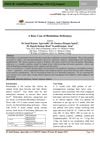Partial Biotinidase Deficiency: Clinical and Biochemical Features
January 1990
in “
The Journal of Pediatrics
”
TLDR Children with partial biotinidase deficiency are healthy at birth but may develop symptoms that improve with biotin therapy.
The study on partial biotinidase deficiency, identified through neonatal screening, revealed that children with this condition were generally healthy at diagnosis. However, one untreated child developed symptoms such as hypotonia, hair loss, and skin rash, which improved with biotin therapy. Among family members of affected infants, four adults and three children were found to have partial deficiency, all of whom were healthy, except for one sibling with elevated urinary lactate. A fifth adult volunteer with partial deficiency later showed minor symptoms that resolved with biotin treatment. The findings suggested that while children with partial biotinidase deficiency are symptom-free at birth, some may develop symptoms similar to profound deficiency, indicating that biotin therapy could be beneficial.

